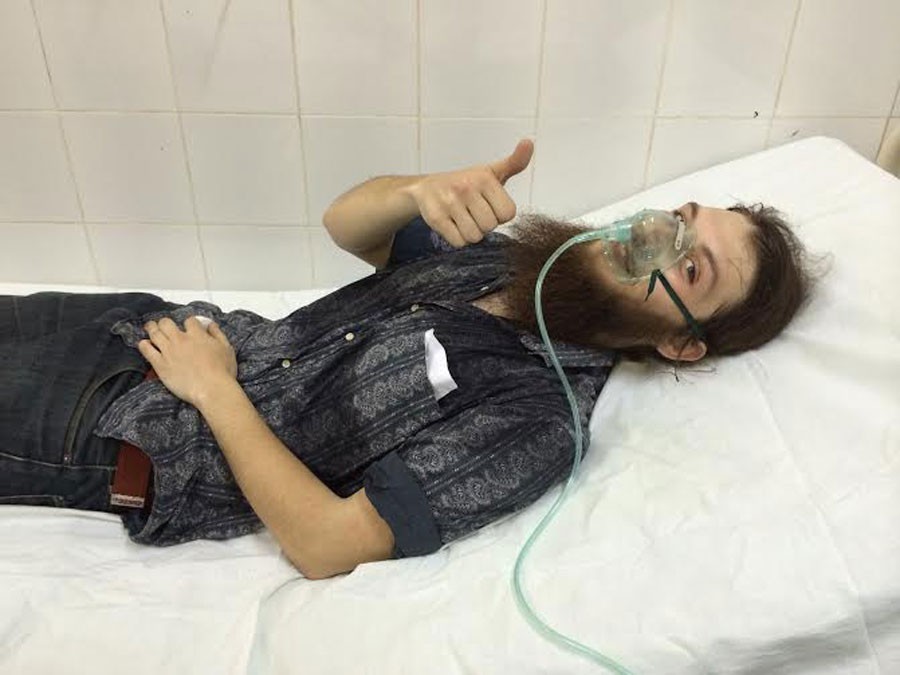My encounter with Cuban health care
Thumbs up during oxygen treatment
Recently, I traveled with a class from Johnson State called “The Art and Culture of Cuba.” The trip provided countless unforgettable memories for everyone on the trip. A saying we kept using on the trip, considering that in Cuba things don’t always go as planned, was, “It’s either a good time or a good story.” I had a great time overall, but late into the trip I was struck with a good story.
Not very long into the trip, a few of our group became ill, victims of a particularly vicious stomach bug. At first, we blamed the food, saying we must have eaten some bad fish or undercooked meat. But as the week progressed, we learned that it was a short but apparently contagious bug. As people recovered, others took their place. After thinking I was a ticking time bomb for most of the week, I finally had resolved on Thursday morning, two days before we were to depart, that I was in the clear.
Not so fast. Fast forward to Thursday evening, when our group was attending a club concert featuring the legendary Arsenio Rodriguez band. After the first set, I walked out of the seating area and through the door to the bar and patio area, hoping to catch some fresh air.
A small twinge in my stomach informed me that I may not be well, but I shook it off as a small cramp, and noted to Nancy Shaw, Tyrone’s wife, that I felt a little off.
“Are you sick?” she asked. No sooner had I said “no” and turned around to continue my previous conversation than I was off at full speed for the bathroom, holding the contents of my stomach back.
As I hugged the toilet like it was my only chance of salvation, I thought about what could be causing this. Only two daiquiris couldn’t possibly cause this, and I had eaten just fine hours before. Finally, as I lay in agony by the bowl, I conceded defeat. I was among the stricken. But when I described my lack of feeling in my hands and other symptoms, Tyrone decided, “We’re taking you to a clinic.”
Now this is where the good time is supposed to turn into a good story, but I have to say this next part was both. As I nearly passed out in the backseat of Tyrone’s friend Pedro’s car, Pedro sped through dark, one-way Cuban alleys to get to the clinic. Pedro translated my symptoms to the doctor on call as I hobbled in, and they instructed me to sit on a table. Flopping sounded a lot better, so I did.
The doctor immediately took my blood pressure, which was low. He then took a blood sample to test for glucose, which was normal. After asking what I had to eat and drink that day, he moved me to another room, this with a more traditional-looking hospital bed. I couldn’t help but scan the room and start frantically searching for things that should scare me about a third-world hospital. The lack of equipment did at first, with a small square room, two beds, and not much else.
The doctor promptly wheeled in some oxygen, put the mask on me, and let her loose. I was able to regain some level-headedness shortly thereafter, and I realized the absurdity of the situation I was in and laughed. Before Tyrone ran off the inform everyone else that I was ok, I tried to remain positive.
“Tyrone, quick, take a picture,” I said in a muffled, masked voice. He laughed, but obliged. I was given an EKG to make sure my heart was functioning properly, since I had complained of numbness in my limbs. After I got the all clear and a diagnosis of, essentially, “wait it out,” I was released.
Tyrone and Pedro then drove me back to our digs and made sure I was safely in bed before rejoining the group at the club.
What I experienced that evening was a quick sampling of Cuban socialism at street-level: the charge for this unscheduled visit to a clinic, including blood pressure test, glucose test, oxygen, and an EKG? Nada.







Sharon Pritchett • Mar 24, 2016 at 8:05 pm
“The charge for this unscheduled visit to a clinic, including blood pressure test, glucose test, oxygen, and an EKG? Nada.” That’s the big craziness of socialism. It did cost money to do those things, but they didn’t charge you. The cost is borne by everyone in their system, and although that may be convenient for you in this circumstance, and perhaps in some circumstances for some of them, too, they could do a lot better if they had a lot more freedom, political and economic, and if they simply formed non-governmental health cooperatives. So could we.